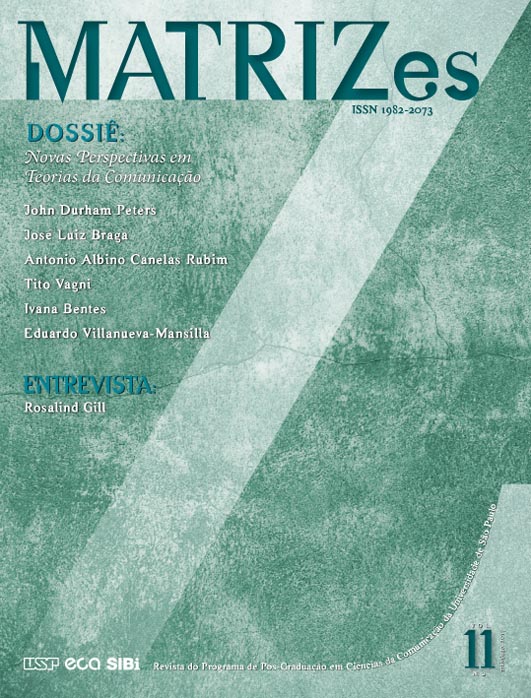Rosalind Gill: “we don’t just want more cake, we want the whole bakery!”
DOI:
https://doi.org/10.11606/issn.1982-8160.v11i2p137-160Keywords:
Comunicação e Gênero, feminismo, representaçõesAbstract
Interview with Rosalind Gill.
Downloads
References
ANG, I. Watching Dallas: soap opera and the melodramatic imagination. Londres: Methuen, 1985.
BANET-WEISER, S.; MILTNER, K. M. Confidence you can carry!: girls in crisis and the market for girls’ empowerment organisations. Continuum, Journal of Media & Cultural Studies, Abingdon, v. 29, n. 2, 2015. DOI: http://dx.doi.org/10.1080/10304312.2015.1022938
______. #MasculinitySoFragile: culture, structure, and networked misogyny. Feminist Media Studies, Abingdon, v. 16, n. 1, p. 171-174, 2016. DOI: http://dx.doi.org/10.1080/14680777.2016.1120490
BANKS, M.; GILL, R.; TAYLOR, S. (Eds.). Theorizing cultural work: lab our, continuity and change in the creative industries. Londres: Routledge, 2013.
BILLIG, M. Fascists: social psychological view of the national front. Londres: Academic Press, 1978.
CONOR, B.; GILL, R.; TAYLOR, S. Gender and creative labour. The Sociological Review, Londres, v. 63, n. 1, p. 1-22, 2015. DOI: http://dx.doi.org/10.1111/1467-954X.12237
ELIAS, A. S.; GILL, R.; SCHARFF, C. (Eds.). Aesthetic labour: rethinking beauty politics in neoliberalism. Londres: Palgrave Macmillan, 2017. DOI: http://dx.doi.org/10.1057/978-1-137-47765-1_1
ESCOSTEGUY, A. C. Estudos latino-americanos de recepção de mídia: notas sobre o significado de gênero e metodologias de pesquisa. Revista Famecos, Porto Alegre, v. 11, n. 24, 2004. DOI: http://dx.doi.org/10.15448/1980-3729.2004.24.3264
FALUDI, S. Backlash: the undeclared war against american women. Nova Iorque: Crown, 1991.FARRIS, S. R. Femonationalism and the “regular” army of labor called migrant women. History of the Present: A Journal of Critical History, Champaign, v. 2, n. 2, 2012. DOI: http://dx.doi.org/10.5406/historypresent.2.2.0184
FRASER, N. Fortunes of feminism: from state-managed capitalism to neoliberal crisis. Londres: Verso, 2013.
GAUNTLETT, D. Media, gender and identity: an introduction. Londres: Routledge, 2008.GILL, R. Gender and the media. Londres: Polity Press, 2007.
______. Postfeminist sexual culture. In: CARTER, C.; STEINER, L.; MCLAUGHLIN, L. (Eds.). TheRoutledge companion to media and gender. Abingdon: Routledge, 2014. p. 589-599.
______. Post-postfeminism?: new feminist visibilities in postfeminist times. Feminist Media Studies, v. 16, n. 4, p. 610-630, jun. 2016.
______. Beyond individualism: the psychosocial life of the neoliberal university. In: SPOONER, M. (Ed.). A critical guide to higher education & the politics of evidence: resisting colonialism, neoliberalism, & audit culture. Regina: University of Regina Press, 2017. p. 1-22.
GILL, R.; ORGAD, S. The confidence culture. Australian Feminist Studies, Abingdon, v. 30, n. 86, p. 324-344, 2016. DOI: http://dx.doi.org/10.1080/08164649.2016.1148001
GILL, R.; SCHARFF, C. (Eds.). New femininities: postfeminism, neoliberalism and subjectivity. Basingstoke: Palgrave Macmillan, 2011.GOLDMAN, R. Reading ads socially. Nova Iorque: Routledge, 1992.
GOFFMAN, E. Gender advertisements. Londres: Palgrave Macmillan, 1979.
GRINT, K.; GILL, R. (Eds.). The gender-technology relation: contemporary theory and research. Londres: Taylor and Francis, 1995.
HARAWAY, D. A cyborg manifesto: science, technology and socialist feminism in the late twentieth century. In: BELL, D.; KENNEDY, B. M. (Eds.). The Cybercultures Reader. Londres: Routledge, 2000. p. 291-324.
HARCOURT, W. Transnational feminist engagement with 2010 plus Activisms. Development and Change, Haia, v. 44, p. 621-637, 2013. DOI: http://dx.doi.org/10.1111/dech.12038
KELLER, J.; RYAN, M. Call for chapters: emergent feminisms and the challenge to postfeminist media culture. 2014. Disponível em: <http://arcyp.ca/archives/4244>. Acesso em: 22 jul. 2017.
MARTIN, L. H.; GUTMAN, H.; HUTTON, P. H. (Eds.). Technologies of the self: a seminar with Michel Foucault. Londres: Tavistock, 1988.
MARTINEZ, M.; LAGO, C.; LAGO, M. C. S. Gender Studies in Brazilian Journalism Research: a tenuous relationship. In: JRE SECTION – IAMCR CONFERENCE, 2015, Montreal. Anais... Montreal: UQAM, 2015.
MATOS, C. Globalization, gender politics and the media: from the West to Latin America. Lanham: Lexington Books, 2016.
MATOS, C. New Brazilian feminisms and online networks: cyberfeminism, protest and the female “Arab Spring”. International Sociology, Thousand Oaks, v. 32, n. 3, p. 417-434, 2017. DOI: http://dx.doi.org/10.1177/0268580917694971
MCNAIR, B. Striptease culture: sex, media and the democratisation of desire. Londres: Routledge, 2002.
MCROBBIE, A. Anti-feminism, then and now. Open Democracy, Londres, 28 nov. 2016. Disponível em: <https://goo.gl/uPaKyT>. Acesso em: 22 jul. 2017.
MONTIEL, A. V. (Ed.) Media and Gender: a scholarly agenda for the Global Alliance on Media and Gender. Paris: Unesco; IAMCR, 2014.
PLANT, S. The future looms: weaving women and cybernetics. Body and Society, Londres, v. 1, n. 3-4, p. 45-64, 1995. DOI: http://dx.doi.org/10.1177/1357034X95001003003
PUAR, J. Rethinking homonationalism. International Journal of Middle East Studies, Cambridge, v. 45, n. 2, p. 336-339, 2013. DOI: https://doi.org/10.1017/S002074381300007X
RADWAY, J. A. Reading the romance: women, patriarchy and popular literature.2. ed. Chapel Hill: University of North Carolina, 1991.
RYAN-FLOOD, R.; GILL, R. Secrecy and silence in the research process: Feminist reflections. Londres: Routledge, 2010.
ROTTENBERG, C. The rise of neoliberal feminism. Cultural Studies, Abingdon, v. 28, n. 3, p. 418-437, 2014. DOI: http://dx.doi.org/10.1080/09502386.2013.857361
______. Neoliberal feminism and the future of human capital. Signs: Journal of Women in Culture and Society, Boston, v. 42, n. 2, p. 329-348, 2017. DOI: https://doi.org/10.1086/688182
SANDBERG, S.; SCOVELL, N. Lean In: women, work and the will to lead. Londres: W H Allen, 2015.
SKEGGS, B. Refusing to be worn out (entrevista a Veneza M. Ronsini e Gustavo Dhein). MATRIZes, São Paulo, v. 11, n. 1, p. 85-98, jan./abr. 2017. DOI: http://dx.doi.org/10.11606/issn.1982-8160.v11i1p85-98
SLAUGHTER, A.-M. Unfinished business: women men work family. Londres: Oneworld, 2016.
TUCHMAN, G.; DANIELS, A. K.; BENÉT, J. (Eds.). Hearth and home: images of woman in the mass media. Oxford: Oxford University Press, 1978.
VALENTI, J. Full frontal feminism: a young women’s guide to why feminism matters. Emeryville: Seal Press, 2014.
Downloads
Published
Issue
Section
License
Authors who publish in this journal agree to the following terms:
- Authors retain the copyright and grant the journal the right to first publication, with the work simultaneously licensed under the Creative Commons Attribution License (CC BY-NC-SA 4.0) which allows sharing of the work with acknowledgment of authorship and initial publication in this journal for non-commercial purposes.
- Authors are authorized to assume additional contracts separately, for non-exclusive distribution of the version of the work published in this journal (eg, publishing in institutional repository or as a book chapter), with acknowledgment of authorship and initial publication in this journal.






















